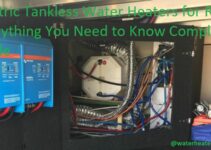Are you looking for the best power vent water heater to suit your needs this 2023? Don’t worry, you’re not alone! This comprehensive guide will help you find the perfect power vent water heater that fits both your requirements and budget.
You’ll learn about the features, brands, and prices of the best power vent water heaters so that you can make an informed decision.
Best power vent water heater 2023
- Generic BTU eF Water Heater (Editor’s Pick)
- A.O. Smith GPVL-50 Water Heater (Best Overall)
- Rheem PROG50-42N Water Heater (Budget Friendly)
1)Generic BTU eF Water Heater
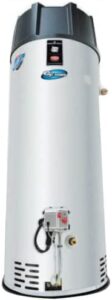
This Generic BTU eF Water Heater is an indoor installation type with a rated capacity of 50 gallons. It can provide up to 76000 BTUs of natural gas and can heat up to 120 gallons of water per hour. Its energy saver feature ensures that it is both cost efficient and eco-friendly.
Additionally, its 50 gallon capacity makes it ideal for large households or businesses. Its modern design and look also gives it that special touch. All in all, this unit is sure to meet all your needs for both residential and business hot water needs. Highly recommended!
2)A.O. Smith GPVL-50 Water Heater
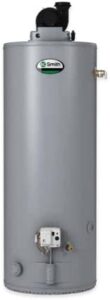
The A.O Smith GPVL-50 is a great water heater when it comes to both convenience and efficiency. It’s a 50-gallon tank, coming in both classic and contemporary grey aesthetic, perfect for any home. With a 3-position blower, it offers flexibility and convenience, allowing total customization according to climate needs. The tank is designed for durability with a 3-inch Dynaclean II dip tube and patented magnesium anode rods that control corrosion and sediment build-up.
The temperature control and LED displays make it simple to adjust and monitor. The patented Blue Diamond Glass Lining technology shields and strengthens the tank, ensuring a longer lifespan and making it durable and energy-efficient.Overall, the A.O. Smith GPVL-50 is a feature-packed water heater that will serve your home with maximum convenience, efficiency and flexibility. Its user-friendly design and superior durability make it an ideal choice for any home.
3)Rheem PROG50-42N Water Heater

The Rheem PROG50-42N Water Heater is an energy-efficient and long-lasting water heating solution. This water heater produces 42,000 BTUs of heat and comes in a 50 gallon capacity. It has 100 equivalent feet for hot water output. Additionally, this water heater has a blower that exhausts unwanted fumes and maximizes the energy used to heat the water.
The Rheem R-Tech Technology helps to extend the life of this water heater and keeps it running smoothly for many years. Additionally, it has an anode rod that helps to prevent corrosion and damage over time. Overall, the Rheem PROG50-42N Water Heater is a highly efficient water heating solution that will last you a long time.
4)Generi Water Heater
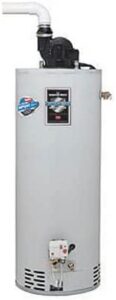
The Generi Water Heater is a great product for residential water heating. It features a large 40-gallon tank and 40000 BTU/hour of power. This provides lots of hot water for showers and other needs. It can be easily installed indoors, making it convenient for the homeowner, and also comes with a 10-year warranty for peace of mind.
The tank is made from heavy-duty polyvinyl chloride and acrylonitrile butadiene with a thermostat for precise temperature control. The Generi Water Heater also has a tank-within-a-tank design for enhanced safety and temperature control. This makes it great for those who need a reliable source of hot water and want a long-lasting product.
5)Generic AO Water Heater

The Generic AO Water Heater is a great option for any home. This type of heater has a 50 gallon capacity and is made of stainless steel which makes it more durable compared to other options. Installation is easy since it can be done indoors, which is a great time saver. It has an input of 42000 BTU and a .68 energy factor making it a very efficient model.
The unit also comes with a 207 lbs weight rating and is easy to install. It is a great option for anyone looking for a reliable and efficient water heater that won’t break the bank. For a water heater that provides an excellent value for the price, the Generic AO Water Heater is a great option for those looking for a reliable, energy efficient unit.
6)Generic EF67 Vent Water Heater

The Generic EF67 Vent Water Heater is a great choice for heating recreational spaces like campers, cabins, and garages. This gas-powered forced-air heater is capable of heating up to 1000 square feet and has an impressive 42000 BTU capacity. Its robust construction ensures durability, and the unit weighs a substantial 170 pounds. For those who need to conserve space, it also has a tall type design.
The Generic EF67 can keep my spaces warm and comfortable, while its tall type design limits the amount of space taken up by the unit. Its sheer power ensures that no matter how large the space, it can adequately heat the area. Its gas-powered design packs the punch of larger units, but has a much more compact size. Its robust construction ensures reliability and durability. The 170-pound design also adds to its overall sturdiness.In conclusion, the Generic EF67 is a great choice for recreational spaces in need of reliable, powerful heat. Its tall type design, robust construction, and 42000 BTU capacity make it an ideal choice for those who need to efficiently heat their interior space.
Best power vent water heater 2023-Complete Buying Guide
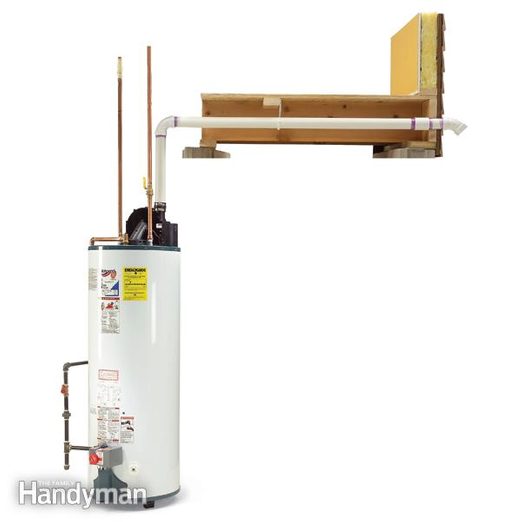
Photo Source : familyhandyman.com
The power vent water heater is an efficient and reliable way to heat your home’s water supply. Power vent water heaters are available in a variety of sizes and capacities. This guide will help you choose the best power vent water heater for your needs in 2020.
When choosing a power vent water heater, there are several important factors to consider. You’ll need to consider the size of the unit, its energy efficiency rating, and its price range. Additionally, you’ll want to research which type of fuel source is best for your home and be sure that it is compatible with your current piping system.
It’s worth mentioning that some states may require specific types of venting systems or special regulations dealing with power vents, so be sure to check any relevant local code or regulations before purchasing a new unit. This guide will also provide information on the different types of power vents available on the market as well as tips on maintaining and extending the life of your unit.
Explanation of a power vent water heater

Photo Source : thisoldhouse.com
A power vent water heater is a type of water heater that vents hot gases created by the burning process directly from the system using an electric motor-driven fan. Rather than relying on natural draft, this venting system forces the hot exhaust out of your home or business, making it more efficient and cost-effective than natural draft systems, while providing increased safety as well.
Power vent water heaters can be fueled by both gas and electricity to heat your water. They come in a variety of sizes and capacities to best meet your requirements, depending on the size and configuration of your family or business needs. The cost savings resulting from their high efficiency ratings are hard to ignore – in some cases resulting in up to 30 percent in annual energy savings!
There are two main types of power vent water heaters – indirect vented (or direct vented) and concentric vented – both with unique features that have benefits for particular situations. Indirect vented tanks draw air from outside the house for ventilation purposes which requires outside tubing for wall penetration; concentric vented tanks provide ventilation without external components, allowing them to fit into tighter spaces within your home or office.
Whether you’re replacing an older unit or installing a new one, selecting a power vent water heater will offer you endless benefits such as energy efficiency ratings up to 98%. Besides offering excellent energy efficiency that results in lower utility bills, a power vent system provides flexibility with multiple installation options so you can accommodate tight spaces or different access points easily.
Importance of choosing the best power vent water heater
Choosing the right power vent water heater is an important decision that will affect your fuel and energy bills for years to come. Not only will it cut down on the amount you pay each month, but it can also save you money in the long run by providing hot water more efficiently than an inefficient central heating system. Power vent water heaters come in a variety of sizes, from small tankless models to larger multiple-tank styles.
It’s important to consider several factors such as your home or business’s hot water needs, your budget, and the fuel type before you choose a power vent system.
In addition to being more efficient than other types of water heaters, power vents can help reduce overall energy costs. Power vented systems have an intake pipe outside and special fans that use warm air from around the tank to help move heated air out through a vent pipe into your home or business. The warm air is recycled back into the environment rather than simply exiting and wasting energy. This type of ventilation helps move heated air much faster – up to five times faster than with traditional ventilation systems – resulting in lower operating costs and improved efficiency. As a bonus, they are also much quieter than standard tanks as they do not require circulation pumps in order to be effective.
Purpose of the buying guide
The purpose of this buying guide is to provide a comprehensive review of power vent water heaters currently on the market. This guide will provide information on what types of water heaters are available, along with details about their features, benefits and even some tips for harm-free installation. Additionally, the buying guide will offer insight into consumer resources available for research and comparison shopping before making a purchase decision. The goal is to demystify the process so that buyers can make an informed choice about investing in a power vent water heater.
Understanding the Features and Benefits of Power Vent Water Heaters
Power vent water heaters are different from traditional units in terms of how they are vented and how hot water is delivered. It utilizes either a motor or fan to push or draw the exhaust gases out of the house. Power vent water heaters also have several features and benefits that traditional models do not offer including:
- Longer service life
- Increased energy efficiency
- Greater flexibility in installation areas
- Quieter performance
- And more
A power vent system offers many advantages over standard residential tank-type models primarily due to the layout of its exhaust system. By using a fan or motor instead of natural convection (the flow of heated air through the venting pipe), some types of power-vent tanks can get exhaust out faster and with less heat loss than is possible with other more conventional types. This reduces the amount of time it takes for hot water to be delivered and results in greater efficiency for you.
Other advantages include:
- Longer service life due to a much higher surface temperature limit on these units than what you’d usually find with conventional models
- Increased energy efficiency due to higher temperature limits on their hot water storage tanks coupled with advanced insulation designed specifically for them (as well as careful selection of materials used in construction)
- Increased safety from qualifying for use indoors due to an enclosed flue design that works better than most standard setups which rely solely on natural draft for releasing fumes
- Easier ventilation solutions when limited attic space is available transpires
- And quieter performance far below what you will hear from a typical tank model.
Explanation of key features
If you’re shopping for a new power vent water heater, there are a few key features that will make your purchase more successful. Here is an overview of the important features of these units, which should help you make the best choice for your home.
- Venting: Power vent water heaters are designed to use less energy than traditional tanks because they utilize induced draft engines to push hot exhaust gasses outside. This also allows them to be installed much closer to walls and other structures than other types of water heaters, making them ideal if you have a tight space constraint where your hot water heater needs to go. Additionally, power vents can be directed in any direction allowing maximum flexibility when choosing where to place it in your home.
- Heat Exchangers: These heat exchangers are one of the most important components of power vent water heaters as they provide efficient transfer between the combustion chamber and the storage tank itself improving efficiency quite dramatically compared when used with traditional tanks.
- Gas Burners: These burners are essential for controlling temperature output as well as airflow and efficiency rates on power vent water heaters. Some advanced gas burners offer additional safety and convenience features such as flame safeguard technology or spark ignition, which helps keeps safety in check while boosting performance levels and energy savings simultaneously, making them well worth considering when looking at various power vent models on the market today.
Venting options
When purchasing a new water heater, the venting system and compatibility should be a priority for consideration. A power vent water heater has either a PVC piping system or an integrated fan to assist with the release of combustion gases that can occur when combusting natural gas for water heating. Compared to conventional water heaters, these vent-assist systems require less maintenance, are more efficient and save energy.
The three available categories of venting all have advantages and disadvantages so it’s important to consider each one separately in order to decide which one will suit your case the best. The options are:
- Direct Vent: Also referred to as “atmospheric” vented, this type of venting uses two PVC pipes running either through the attic wall or outside walls, one for air intake and one to expel wasted air. This setup always takes up more space but is probably the most efficient and secure way of dealing with gas combustion gases, as no flue is needed in this design which reduces potential risks associated with flues (such as backdrafts).
- Power Vent: This type is recognized for being low-maintenance since it requires only 1 vent pipe for both intake & exhaust since it works with an integrated fan helping push out harmful combustion gases from your home quickly. A drawback could be the extra noise generated by the fan during operation due to its motorized design.
- B-Vent: It works much like direct vent but uses only 1 PVC pipe instead of 2 pipes; It runs from inside your home throughout the roof in order to expel any harmful gasses via roof termination or top mounted cap. Installation costs are lower for this type but installation complexity can be higher because you might need to use several elbows & pitched extensions in order to fit certain space requirements & sloped roofs on some houses/buildings.
Factors to Consider When Buying a Power Vent Water Heater
Before purchasing a power vent water heater, you should familiarize yourself with all the relevant factors that could impact your decision. Below is a definition of some of the most important considerations for selecting the right water heater for your home.
- Unit Capacity: The first step is to determine the unit capacity, which refers to how much hot water it can provide at one time depending on various factors like family size, housing arrangements and volume of usage. You can get an estimate of this by calculating how many gallons per hour your family needs or by consulting a plumber.
- Installation: When installing, make sure to note if and how modifications to the existing plumbing will be necessary to accommodate the new unit as well as details such as local codes that may need to be followed. Also keep in mind any additional piping, venting or wiring that may be required due to space restrictions and other environmental requirements in order for installation to proceed smoothly.
- Efficiency Rating: An efficiency rating helps when comparing different models because it lets you know what level of energy efficiency you can expect from each model in terms of everyday operation and cost savings over time. Look for units with higher Energy Star ratings which indicate that they comply with strict government standards for energy efficiency levels and performance tests verified by independent third parties for quality assurance purposes.
- Cost: Before making any final purchases, evaluate monthly operating costs by comparing prices from different manufacturers as well as taxes and rebates associated with buying power vent water heaters from specialized suppliers online versus in stores. In addition, insured warranties are also worth factoring in especially if they provide additional coverage beyond what is included with product purchases usually only cover labour-related costs rather than parts themselves but insurance plans can compensate this difference if needed so you don’t have unexpected repair bills on top of regular maintenance expenses down the line.
Size and capacity
When it comes to choosing the right size and capacity for your new power vent water heater, there are several factors to consider. First, you need to decide how much hot water is needed on a routine basis. Your household size and hot water usage will determine the size of the tank needed. Generally speaking, the larger the tank size, the more efficient and cost-effective it will be in the long run. Additionally, you should keep in mind any potential load demands that may arise from large appliances such as dishwashers or Jacuzzis that may require large amounts of hot water at once.
The next factor to consider is energy efficiency ratings and energy sources available in your area. Electric models tend to have a slightly higher upfront cost than natural gas units but they do not produce any greenhouse gases during operation. Natural gas units are typically cheaper upfront but will require venting systems with regular maintenance checks for continued efficient performance.
Finally, it’s important to look at features such as control options (e.g., digital or mechanical) and warranty protection (e.g., length and labor). Knowing how much time and money you’re willing to spend on installation and maintenance can help you narrow down your choice of power vent water heaters even further.
Energy efficiency
When selecting a power vent water heater, you should consider its energy efficiency rating since this could save you money on your monthly utility bills. The efficiency and overall performance of a water heater can depend on multiple factors such as the type of fuel used and the size of the unit. For instance, natural gas models usually offer the most efficient performance, while electric models require more energy to produce hot water. In addition, larger units tend to have better energy efficiency ratings than smaller models.
When evaluating a unit’s energy efficiency rating, it is important to look at both its Annual Fuel Utilization Efficiency (AFUE) and Maximum Efficiency Rating (MER). AFUE measures how much energy is actually converted into usable heat; whereas MER takes into account the combustion process for measuring total fuel utilization. Both ratings are measured in percentages, with higher numbers indicating better performance. Thus, a unit with an AFUE rating of 80 percent or higher is considered efficient and could potentially save you money in the long run.
Venting options
There are several venting options to consider when purchasing a power vent water heater. The first is to compare the exhaust type of the heater. This can be done by looking at the model number on the unit, which will indicate if it is direct-vent, indirect-vent, or natural-draft.
- Direct-venting requires exterior air and exhaust openings that are hard piped or configured into a standard PVC vent system.
- Indirect-vent units use a fan to push exhaust out of a tall stack poking through the roof and draw in outside air for combustion from one side of the connections.
- On natural draft models, an exhaust fan pulls flue gases up through a pipe connected to an opening in the roof or wall on the side of your house.
The second option is to look at piping configuration possibilities for your hydronic system needs. There are single-pipe and two-pipe systems equipped with either one intake pipe taking cool air directly into the air intake port or two pipes used simultaneously as both an intake and exhaust port. It’s important to make sure you choose either option based on local code requirements for safe flue gas emission and ventilation rates for your area as well as if it accommodates any specific hydronic piping configuration needs you have for powering a hydronics system like underfloor heating or radiant heating applications.
Conclusion
It is clear from this buying guide that there are many important factors to consider when selecting the best power vent water heater for your home in 2023. Your decision should be based on a combination of factors such as energy efficiency, capacity and design, price and features, safety ratings, installation requirements and maintenance needs.
We hope this guide has given you the information you need to make an informed decision. Remember that a properly installed power vent water heater can provide your family with hot water reliably and safely. Investing in the right type of heater ensures unfailing performance throughout its lifespan while saving you money on monthly utility bills. Thank you for learning more about power vent water heaters!
FAQ’s
What is the number 1 hot water heater?
The Rheem Performance Platinum 50 Gallon Natural Gas Water Heater is considered to be the best hot water heater on the market. It is energy efficient and extremely reliable.
Which water heater brand is best?
The best water heater brand depends on your specific needs. Some of the most reliable brands include Rheem, Kenmore, AO Smith, Bradford White, State, and American Standard. These companies offer a wide range of models, sizes, and designs to suit different needs.
What is the most reliable brand of hot water heater?
It is difficult to name the most reliable brand of hot water heater across the entire industry due to many different options available. However, some brands commonly rated as reliable include A.O. Smith, Rheem, Bradford White, Bosch, and Navien. Before making a purchase, it is important to research reviews and ratings for the product and brand to ensure it meets your needs.
Is power vent water heater better?
Yes, power vent water heaters are usually more energy efficient and can be used with smaller water tanks. They also provide more air circulation to help quickly heat up water supply, so you can get hot water faster. Additionally, power vent water heaters are quieter and more convenient than traditional models, since you don’t have to install a chimney.
Which is the No 1 water heater in India?
The Hindustan Sless Steel Instant Water Heater, manufactured by Havells India Ltd, is currently the number one water heater in India.
Which company water heater is best in India?
There is no clear answer as to which company’s water heater is best in India as different companies offer different features and models that may suit a particular user’s needs. Some popular brands of water heaters in India include Bajaj, Crompton, Racold, AO Smith, Havells, and V-Guard. It is important for users to examine the various factors such as energy efficiency, safety, cost, and durability when selecting a water heater.
Which is the safest water heater?
The safest water heaters are the electric tankless water heaters. These heaters require very little maintenance, save energy, and are not prone to accidental fires or other safety hazards associated with gas or electric storage tank-type water heaters.
Which water heater lasts the longest?
On average, tankless water heaters tend to last about twice as long as their traditional tank counterparts, with an estimated lifespan of 15-20 years. In comparison, traditional tank water heaters tend to last 8-12 years.
Which type of water heater is most popular?
The most popular type of water heater is the tankless water heater. Tankless water heaters heat water instantly and can save users significant money on energy costs over time. They are space-saving, long-lasting, and energy-efficient alternatives to traditional tank-style water heaters.
Which Watt water heater is best?
There is no single \”best\” watt water heater – the best water heater for you will depend on your specific needs, such as the size of your home and the type of fuel you have access to. You may also want to consider features such as energy efficiency, installation requirements, and the warranty offered by the manufacturer. It’s best to do your own research and compare models before making a purchase.
